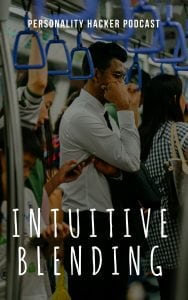Download Episode Here – right click link and select “Save Link As…”
In this episode Joel and Antonia talk about the dangers and pitfalls of hiding your intuition and “intuitive blending” instead of standing out.
In this podcast you’ll find:
- Intuitives are people who use advanced pattern recognition as their primary learning style.
- Sensors value reliable information. Intuitives prefer speculation.
- Intuitives navigate the world that’s not created for them. Because of this, their needs are not met. They can start to believe that they’re broken as if something’s wrong with them.
- They often ask themselves, “How do I see things the way other people do?” “What is it about me?”
- Intuitives have the tendency to know they’re different.
- Since Intuitives are really good in pattern recognition, they don’t get the privilege of blissful ignorance.
- Perspectives users can sometimes be a little detached by how people see them.
- Most Intuitives pick up easily. They’re different and very aware of it. They do get this feeling that something is different inside them.
- Because people who uses the sensory style are looking for something concrete and tangible, in their minds they have categories for everything.
- When Intuitives start to pretend or act as sensors in order to fit in, they are now doing a process called “intuitive blending”.
- With intuitive blending, they’re able to speak both intuitive and sensor languages. As a result, they end up denying an integral piece of who they are. Intuitive blending by definition means suppressing who you are. If an intuitive starts to blend, they have disqualified themselves from basically being understood.
- Intuitive blending is very damaging because they are not getting their primary needs met which is Intuitive Conversation.
- Intuitives want to make an impact regardless if it’s small or big. They want the world to give feedback that they’re doing an excellent job.
- Intuitives have a great gift for leadership.
- A sensor is going to make an impact based on something verifiable and tangible.
- Intuitive Awakening Program – program specifically targeted to Intuitives which is designed to help them become the best version of themselves.
- Only 25% of the people who are Intuitives and if they all go blending, the world stagnates.
To subscribe to the podcast, please use the links below:
Subscribe with iTunes
Non iTunes Link
Download The Android App
Subscribe on Soundcloud
Subscribe with Stitcher
If you like the podcast and want to help us out in return, please leave an honest rating and review on iTunes by clicking here. It will help the show and its ranking in iTunes immensely! We would be eternally grateful!
Want to learn more?
Discover Your Personal Genius
We want to hear from you. Leave your comments below…



Share:
Podcast - Episode 0030 - Introverted Intuition vs Extraverted Intuition
Podcast - Episode 0032 - Finding Intuition Mentors
16 comments
You guys ROCK!!! This is the best!!! Thank for sharing your knowledge with the world. True, true, true!
I really appreciate your podcast and I’ve been binge listening since I found it this past month.
I’m an INFJ, so have lots of this experience of being the only person around thinking the way my mind naturally works.
There are 2 things I would add to the message about Intuitive Blending.
First – there are lots of times in a sensor world that intuitive blending is necessary to make things work — not in deeply personal relationships but in the general world around. If you’re trying to talk about advanced pattern recognition with the check out person at the grocery store, things are going to go badly. I’m also a lawyer, so I have lots of professional situations where I am using intuition to solve problems, but describing them to others in sensor language to get to the win-win outcome. If I were traveling in France, I would assume that the person I run into on the street is going to speak French and would approach them in that manner unless I saw reasons to think they speak English. Similar thing for being a minority intuitive in a 75% sensor world. I think the key is to be conscious about this situation so that using intuitive blending becomes a tool that is used in service of the intuition instead of a camouflage that is based on fear.
Second — When you talk about the intuitive starving for intuitive conversation, I think that one of the ways that intuitives feed that need if they are isolated is to absorb intuitive books and movies. I think this is one of the reasons you often see intuitives as bookworms and buried in the library or in intense fandoms around certain movies or games.
Wow. Good Podcast. This term “blending” names an experience I’ve been conscious of all my life. Now I have a word for it and I need to throw you a hearty thank you.
“Thank You”
2 quick points:
1) Intuitive conversation is important but perhaps more so for intuitive Ti/Fe users. Ideas and conversation. Fi/Te users may, maaaaay, find physical problem solving, Mcgyver-ing, art, writing, musical performance, craft as a more potent dose of the sort of intuition they crave. May.
2) I believe this desire for impact is an integral piece of the intuitive process/mechanism. The nature of intuition is around guessing/pattern seeking/jumping from idea to idea, followed by seeing if you were right or not be the results in the world. And both answers are interesting. If that second part of the intuitive process (confirmation of hypothesis?) isn’t there, intuitive speculation doesn’t get any smarter. It’d be like a scientist performing experiments without looking at the results.
Sheldon Cooper is definitely not an Intuition type. Notice how he loves talking about interesting factoids way more than he does about abstract topics. Since he was a theoretical physicist, I thought he was an Intuition type initially too.
He appears to have a social disorder such as Asperger, which makes him struggle mightily at reading other’s very basic social cues. It is true that he does get somewhat of a pass for his odd behavior, but the behavior is due to his social disorder and not Intuition. Raj and Leonard are very strong Intuition types so if Sheldon was an Intuition it wouldn’t be an issue.
Thanks for your feedback, Dana! I think we could all be blamed for a little bit of “blending” during our formative adolescence. ;)